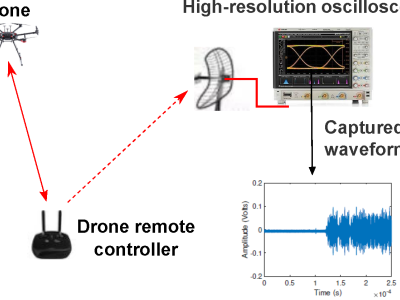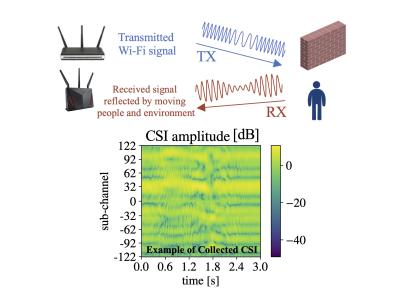Dataset for loosely coupled hybrid scheduling of processing and communication in TSN-based IMA systems

- Citation Author(s):
-
Xuan Zhou
- Submitted by:
- Xuan Zhou
- Last updated:
- DOI:
- 10.21227/xcxb-n346
 138 views
138 views
- Categories:
- Keywords:
Abstract
This dataset serves loosely coupled hybrid scheduling of processing and communication for TSN-based IMA systems. It includes 8 experimental case configurations with 3 structures (mesh, ring and tree) and 3 scales (small, medium and large), and the cases are named with corresponding structure and scale, such as Mesh-structure Small-scale (MS) case, Mesh-structure Medium-scale (MM) case, Mesh-structure Large-scale (ML) case, Ring-structure Small-scale (RS) case, Ring-structure Medium-scale (RM) case, Ring-structure Large-scale (RL) case, Tree-structure Small-scale (TS) case, Tree-structure Medium-scale (TM) case, and Tree-structure Large-scale (TL) case, where MS case and RS case are the same. It also includes the detailed experimental results for scheduling designs based on these cases.
Instructions:
- Basic data structure:
In this dataset, the data is saved in the form of JSON files for easy reading and writing. For the TSN-based IMA systems, object classes mainly include node, link, partition, task and messages. Their related keys are as follows.
- Node: identifier, category (switch or module), con_partition (the identifier list of all partitions in this node), hyper_period (the hyper period of all partitions in this node), utilization (the proportion of partition activation time in this node).
- Link: identifier, src_node (the identifier of its source node), de_node (the identifier of its destination node), con_message (the identifier list of all messages traversing this link), hyper_period (the hyper of all messages traversing this link), utilization (bandwidth utilization of all messages).
- Partition: identifier, module (the identifier of the module in which this partition resides), period, length, con_task (the identifier list of all tasks in this partition), state (the notation of whether this partition has been scheduled, ‘done’ means this partition has been scheduled, and ‘undone’ means this partition cannot be scheduled), offset (the scheduling result, default value is -1).
- Task: identifier, partition (the identifier of the partition in which this task resides), release (the release time of this task, default value is 0, support further model improvement), period, length, deadline, priority (default value is -1, dynamically assign value during the scheduling, support further model improvement), state (the notation of whether the bounds of this task has been calculated), bound (‘wcrt’ is the worst-case response time, ‘bcrt’ is the best-case response time, ‘wcst’ is the worst-case release time, and ‘bcst’ is the best-case release time, note that for task-message hybrid scheduling methods, ‘bcst’ and ‘wcst’ are both the scheduling offset of this task, ‘bcrt’ and ‘wcrt’ are both the sum of the scheduling offset and the length of this task).
- Message: identifier, src_node (the identifier of its source node), des_node (the identifier of its destiniation node), src_partition (the identifier of its source partition), des_partition (the identifier of its destination partition), src_task (the identifier of its producer task), des_task (the identifier of its consumer task), period, length, mode (queue or sample, support further model improvement), deadline, bandwidth, state (the notation of whether this message has been scheduled, ‘done’ means this message has been scheduled, and ‘undone’ means this message cannot be scheduled), inject (the injection time of this messages, also the scheduling result), path (the identifier list of the links that this message traverses), offset (the offset of this message on corresponding links, also the scheduling result), delay (‘network’ is the network-layer ETE delay of this message, ‘application’ is the application-layer ETE delay of this message).
- Case_configuration Folder: the original configuration of all cases, where node.json only includes identifier and category, link.json only includes identifier, src_node and des_node, partition.json only includes identifier, module and length, task.json only include identifier, partition, period and length, message.json onlye includes identifier, src_task, des_task and length.
- Case_initialization Folder: the initialization configuration of all cases after automatically completing all required information for scheduling design.
- Comparison_algorithm Folder: the scheduling results of different algorithms, where PMNP and PMWP are our proposed partition-(task)-message scheduling algorithms, MQO is an optimized message scheduling algorithm, MES is a (task)-message scheduling algorithm, TMPR and TMSC are two task-message scheduling algorithms.
- Comparison_parameter Folder: the scheduling results of our partition-(task)-message scheduling algorithm with different parameters, including injection mode (centralized and distribute), transmission rate (100Mbps, 125Mbps, 200Mbps, 250Mbps, 300Mbps, 400Mbps, 500Mbps, 1000Mbps), slot length of ICT (0.01ms, 0.1ms, 0.2ms, 0.5ms, 1ms, 2ms), and slot length of GCL (1ns, 5ns, 10ns, 50ns, 100ns, 200ns, 250ns, 500ns, 1000ns, 2000ns, 2500ns, 5000ns, 10000ns, 20000ns)
- Simulation Folder: the results of 50 simulations for each experimental case based on our partition-(task)-message scheduling results.








- 南非荷兰语
- 阿尔巴尼亚语 - shqipe
- 阿拉伯语 -
- 亚美尼亚语 - Հայերէն
- 阿塞拜疆语 - azərbaycanca
- 巴斯克语 - euskara
- 白俄罗斯语 - беларуская
- 孟加拉语 - বাংলা
- 保加利亚语 - български
- 加泰罗尼亚语 - català
- 中文 - 中文(简体中文)
- 中文 - 中文 (繁体中文)
- 克罗地亚语 - hrvatski
- 捷克语 - čeština
- 丹麦语 - dansk
- 荷兰语 - 荷兰语
- 英语
- 世界语 - 世界语
- 爱沙尼亚语 - eesti
- 菲律宾语
- 芬兰语 - suomi
- 法语 - français
- 加利西亚语 - galego
- 格鲁吉亚语 - ქართული
- 德语 - Deutsch
- 希腊语 - Ελληνικά
- 古吉拉特语 - ગુજરાતી
- 海地克里奥尔语 - kreyòl ayisyen
- 希伯来语 - עברתת
- 印地语 - हिन्दी
- 匈牙利语 - 马扎尔语
- 冰岛语 - íslenska
- 印度尼西亚语 - 印尼语
- 爱尔兰语 - Gaeilge
- 意大利语 - italiano
- 日语 - 日本語
- 卡纳达语 - ಕನ್ನಡ
- 韩语 - 한국어
- 拉丁语 - Lingua Latina
- 拉脱维亚语 - latviešu
- 立陶宛语 - lietuvių
- 马其顿语 - македонски
- 马来语 - 马来语
- 马耳他语 - 马耳他语
- 挪威语 - norsk
- 波斯语 - فف٢٠
- 波兰语 - polski
- 葡萄牙语 - português
- 罗马尼亚语 - română
- 俄语 - русский
- 塞尔维亚语 - Српски
- 斯洛伐克语 - slovenčina
- 斯洛文尼亚语 - slovenščina
- 西班牙语 - español
- 斯瓦希里语 - 斯瓦希里语
- 瑞典语 - svenska
- 泰米尔语 - தமிழ்
- 泰卢固语 - తెలుగు
- 泰语 - ไทย
- 土耳其语 - Türkçe
- 乌克兰语 - українська
- 乌尔都语 - اردو
- 越南语 - Tiếng Việt
- 威尔士语 - Cymraeg
- 意第绪语 - יידיש
双击 选择翻译- Afrikaans
- Albanian - shqipe
- Arabic - العربية
- Armenian - Հայերէն
- Azerbaijani - azərbaycanca
- Basque - euskara
- Belarusian - беларуская
- Bengali - বাংলা
- Bulgarian - български
- Catalan - català
- Chinese - 中文(简体中文)
- Chinese - 中文 (繁體中文)
- Croatian - hrvatski
- Czech - čeština
- Danish - dansk
- Dutch - Nederlands
- English
- Esperanto - esperanto
- Estonian - eesti
- Filipino
- Finnish - suomi
- French - français
- Galician - galego
- Georgian - ქართული
- German - Deutsch
- Greek - Ελληνικά
- Gujarati - ગુજરાતી
- Haitian Creole - kreyòl ayisyen
- Hebrew - עברית
- Hindi - हिन्दी
- Hungarian - magyar
- Icelandic - íslenska
- Indonesian - Bahasa Indonesia
- Irish - Gaeilge
- Italian - italiano
- Japanese - 日本語
- Kannada - ಕನ್ನಡ
- Korean - 한국어
- Latin - Lingua Latina
- Latvian - latviešu
- Lithuanian - lietuvių
- Macedonian - македонски
- Malay - Bahasa Melayu
- Maltese - Malti
- Norwegian - norsk
- Persian - فارسی
- Polish - polski
- Portuguese - português
- Romanian - română
- Russian - русский
- Serbian - Српски
- Slovak - slovenčina
- Slovenian - slovenščina
- Spanish - español
- Swahili - Kiswahili
- Swedish - svenska
- Tamil - தமிழ்
- Telugu - తెలుగు
- Thai - ไทย
- Turkish - Türkçe
- Ukrainian - українська
- Urdu - اردو
- Vietnamese - Tiếng Việt
- Welsh - Cymraeg
- Yiddish - יידיש
Double-click Select to translate 翻译- 南非荷兰语
- 阿尔巴尼亚语 - shqipe
- 阿拉伯语 -
- 亚美尼亚语 - Հայերէն
- 阿塞拜疆语 - azərbaycanca
- 巴斯克语 - euskara
- 白俄罗斯语 - беларуская
- 孟加拉语 - বাংলা
- 保加利亚语 - български
- 加泰罗尼亚语 - català
- 中文 - 中文(简体中文)
- 中文 - 中文 (繁体中文)
- 克罗地亚语 - hrvatski
- 捷克语 - čeština
- 丹麦语 - dansk
- 荷兰语 - 荷兰语
- 英语
- 世界语 - 世界语
- 爱沙尼亚语 - eesti
- 菲律宾语
- 芬兰语 - suomi
- 法语 - français
- 加利西亚语 - galego
- 格鲁吉亚语 - ქართული
- 德语 - Deutsch
- 希腊语 - Ελληνικά
- 古吉拉特语 - ગુજરાતી
- 海地克里奥尔语 - kreyòl ayisyen
- 希伯来语 - עברתת
- 印地语 - हिन्दी
- 匈牙利语 - 马扎尔语
- 冰岛语 - íslenska
- 印度尼西亚语 - 印尼语
- 爱尔兰语 - Gaeilge
- 意大利语 - italiano
- 日语 - 日本語
- 卡纳达语 - ಕನ್ನಡ
- 韩语 - 한국어
- 拉丁语 - Lingua Latina
- 拉脱维亚语 - latviešu
- 立陶宛语 - lietuvių
- 马其顿语 - македонски
- 马来语 - 马来语
- 马耳他语 - 马耳他语
- 挪威语 - norsk
- 波斯语 - فف٢٠
- 波兰语 - polski
- 葡萄牙语 - português
- 罗马尼亚语 - română
- 俄语 - русский
- 塞尔维亚语 - Српски
- 斯洛伐克语 - slovenčina
- 斯洛文尼亚语 - slovenščina
- 西班牙语 - español
- 斯瓦希里语 - 斯瓦希里语
- 瑞典语 - svenska
- 泰米尔语 - தமிழ்
- 泰卢固语 - తెలుగు
- 泰语 - ไทย
- 土耳其语 - Türkçe
- 乌克兰语 - українська
- 乌尔都语 - اردو
- 越南语 - Tiếng Việt
- 威尔士语 - Cymraeg
- 意第绪语 - יידיש
双击 选择翻译